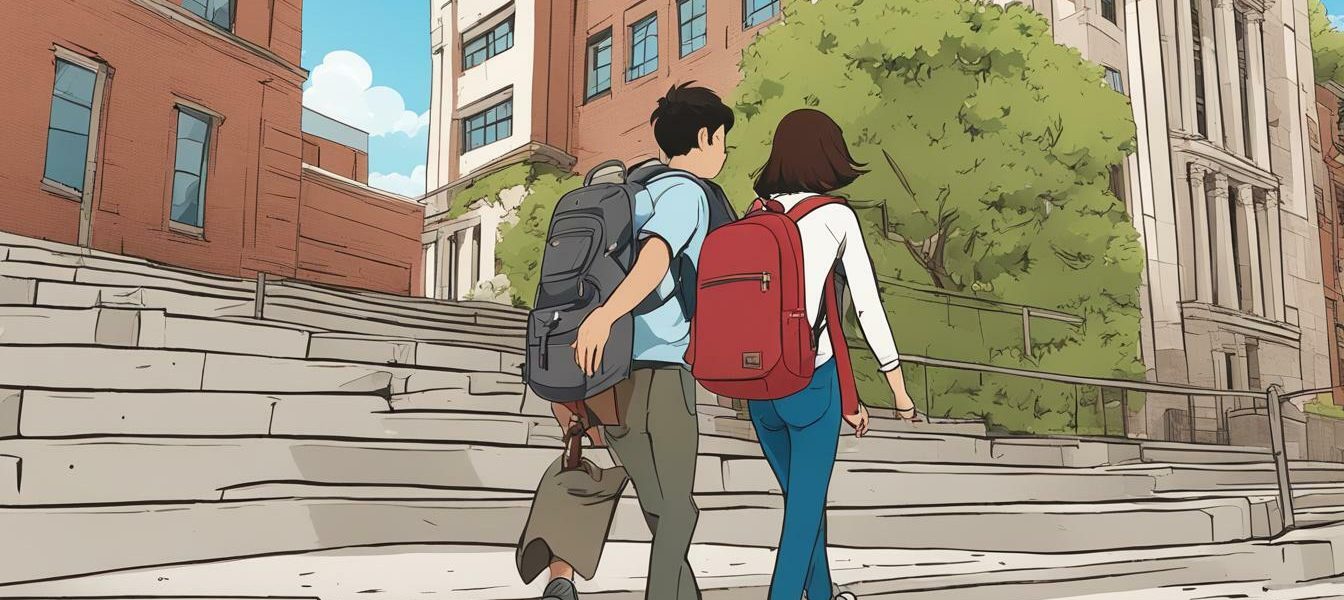
Is College Harder Than High School?
When high school students begin to think about college, one of the questions that often comes to mind is whether college will be harder than high school. It’s a valid concern, as college represents a major transition in a student’s academic life. But is college actually harder than high school? Let’s explore this question and some of the factors that contribute to the answer.
Key Takeaways
- College represents a major transition from high school.
- Many students wonder if college will be harder than high school.
- Factors such as workload, academic expectations, and overall adjustment contribute to the answer.
Understanding the Differences
Transitioning from high school to college can be challenging, especially when it comes to understanding the differences in workload and academic expectations. While high school typically requires attending classes and completing homework assignments, college demands a greater level of independence and self-motivation.
One of the main differences between high school and college is the workload. In college, students are expected to complete more reading and longer assignments, often with less guidance from instructors. This increased workload can be overwhelming for some students, particularly those who have not developed effective time management skills.
Furthermore, the academic expectations in college are generally more rigorous than those in high school. Critical thinking, independent research, and writing skills are highly valued in college, and students are encouraged to think beyond what is covered in the classroom. Additionally, college often requires students to take on more advanced coursework and engage in extracurricular activities to demonstrate their commitment to their field of study.
In summary, the differences in workload and academic expectations can make college more difficult than high school. However, with proper preparation and effective time management, students can successfully navigate the challenges and thrive in their academic pursuits.
Academic Rigor in High School
High school is a critical period of academic development for students. During this time, students prepare themselves for college by taking advanced courses, such as AP classes, to challenge themselves and build a strong foundation for their future academic pursuits.
The level of academic rigor in high school can vary significantly depending on the school and region, but one thing is certain: high school students are expected to excel in their studies and consistently perform at a high level.
Standardized testing, such as the SAT and ACT, also play a significant role in determining a student’s ability to gain admission to colleges and universities. High school students are under immense pressure to prepare for and perform well on these exams to secure their future academic opportunities.
Overall, the academic rigor in high school is significant and can prepare students for the increased workload and academic expectations they will face in college.
Challenges in College
College can be a challenging experience for many students, especially those who are transitioning from high school. While high school may have prepared students adequately for college, the increased rigor and workload can still be overwhelming. Here are some common challenges that students may face in college:
Time Management
One of the main challenges that students face in college is managing their time effectively. In high school, students often have a structured schedule that dictates their day. In college, however, students have greater autonomy over their schedule. This newfound freedom can be liberating, but it can also lead to poor time management if not managed effectively.
To manage their time, students should prioritize their tasks, break down assignments into smaller tasks, and create a schedule that allows them to complete their work on time. They should also avoid procrastination and make use of campus resources such as writing centers and tutoring services if they are struggling.
Higher Level of Difficulty
College courses are generally more difficult than high school courses. Students in college are expected to read more, write more, and think critically about the material presented to them. They will encounter new concepts and theories that they may not be familiar with, and they will be expected to apply this knowledge in assignments and exams.
Students can prepare for this increased rigor by developing good study habits and seeking help when needed. They should also be willing to challenge themselves and take risks in their academic pursuits.
Workload in College
One of the biggest differences between high school and college is the workload. In college, you’ll be expected to take on more responsibility and manage your time effectively to complete all the reading and assignments required for each class.
Longer assignments and more reading are common in college, and it’s important to develop good time management skills to avoid falling behind. Creating a schedule and prioritizing tasks can help you stay on top of your workload.
Effective time management also means making time for downtime and relaxation. While studying is important, taking breaks to recharge can actually improve your overall productivity and success.
Managing Your Time in College
To manage your time effectively in college, try breaking down larger assignments into smaller, more manageable tasks. This can help you avoid feeling overwhelmed and ensure that you’re making progress on your work.
It’s also important to make use of campus resources, such as tutoring services and study groups. These can provide valuable support and help you stay on track with your coursework.
Finally, don’t be afraid to seek help when you need it. Whether it’s talking to a professor or reaching out to a mental health resource, getting the support you need can make all the difference in your college experience.
Academic Expectations in College
College requires a higher level of academic rigor and critical thinking than high school. In order to succeed in college, students need to develop strong research and writing skills, as well as the ability to analyze and interpret complex information.
Professors expect students to take an active role in their own learning and to engage in independent research and critical thinking. This means that students need to be able to effectively analyze and interpret primary and secondary sources, and use that information to develop thoughtful and well-supported arguments.
Writing Skills
Writing is an essential skill in college, and students are expected to write extensively in a variety of formats, from research papers to lab reports. Effective writing requires not only a strong command of grammar and syntax, but also the ability to organize ideas and communicate them clearly and persuasively.
Students can improve their writing skills by practicing regularly, seeking feedback from professors and peers, and utilizing campus writing centers and resources.
Research Skills
College requires students to conduct independent research and use primary and secondary sources to support their arguments. This involves not only finding relevant sources, but also evaluating them for credibility and relevance to their research topic.
Students can develop their research skills by familiarizing themselves with academic databases and online resources, attending library workshops, and seeking guidance from librarians and research mentors.
Critical Thinking Skills
College encourages students to think critically and independently, questioning assumptions and examining evidence to develop their own informed perspectives on complex issues. This requires not only a solid understanding of the subject matter, but also the ability to engage with diverse perspectives and alternative viewpoints.
Students can develop their critical thinking skills by actively participating in class discussions and debates, seeking out diverse perspectives on current events and issues, and practicing critical reflection and self-evaluation.
Studying in College
Effective studying is crucial to success in college. With a higher level of difficulty and increased workload, developing good study habits is essential. Here are some tips to help you make the most of your study time:
- Create a study schedule: Set aside specific times for studying each day and stick to it. This will help you stay on top of your assignments and avoid procrastination.
- Utilize campus resources: Take advantage of study groups, tutoring services, and other academic resources available on campus. These can provide additional support and help clarify difficult concepts.
- Find your ideal study environment: Experiment with different study environments to find what works best for you. Some people prefer complete silence, while others work better with some background noise.
- Break down assignments: Instead of tackling a large assignment all at once, break it down into smaller tasks. This can make the assignment feel less overwhelming and help you stay organized.
- Take breaks: Taking breaks during study sessions can help you stay focused and avoid burnout. Try taking a quick walk or doing a few stretches to refresh your mind and body.
- Stay organized: Keep track of your assignments, due dates, and study schedule in a planner or digital calendar. This can help you stay on top of your tasks and avoid missing deadlines.
Remember, effective studying is not just about putting in long hours – it’s about working smart and using your time efficiently. By implementing these tips, you can develop good study habits and achieve success in college.
Time Management Tips
One of the biggest challenges of college is managing your time effectively. With a greater workload and increased independence, it can be easy to become overwhelmed. However, there are several strategies you can use to make the most of your time and stay on top of your responsibilities.
Create a Schedule
One effective time management tip is to create a schedule for yourself. This can help you prioritize tasks and ensure that you are using your time efficiently. Start by blocking out time for classes, studying, and other commitments, such as work or extracurricular activities. Then, assign specific tasks to each block of time. Make sure to allow for breaks and downtime as well.
Break Down Assignments
Large assignments can be daunting, but breaking them down into smaller tasks can make them more manageable. Create a timeline for completing each part of the assignment, and set specific deadlines for yourself. This will help you stay on track and avoid last-minute cramming.
Find a Balance
While academics are important, it’s also essential to find a balance between your schoolwork and personal life. Make time for self-care activities like exercise, spending time with friends and family, or pursuing hobbies. Maintaining a healthy work-life balance can help prevent burnout and improve your overall well-being.
Utilize Campus Resources
Most colleges offer a variety of resources to help students manage their time and succeed academically. These may include tutoring services, study groups, and time management workshops. Take advantage of these resources to get the support you need and improve your skills.
Ask for Help
If you are struggling with time management or feeling overwhelmed, don’t hesitate to ask for help. Talk to your professors or academic advisors, who can offer guidance and support. You can also reach out to your peers or other support systems on campus, such as counseling services or student organizations.
By using these time management tips, you can take control of your schedule and make the most of your college experience.
Adjusting to College Life
Transitioning from high school to college can be a significant adjustment for students, as it often involves adapting to a new environment, making new friends, and finding a support system. It’s important to remember that this is a normal part of the college experience and with time, things do get easier.
One way to adjust to college life is to get involved on campus. Joining clubs or organizations can help students meet new people who share similar interests. This can provide a sense of community and make the transition to college feel less daunting.
Another way to adjust is to explore the campus and surrounding area. Getting familiar with the campus can help students feel more comfortable and confident in their new surroundings. Additionally, exploring the surrounding area can help students find new places to study, hang out with friends, or simply relax.
It’s also important for students to find a support system in college, whether it be through family and friends, or through campus resources such as academic advisors or mental health services. Seeking help when needed can make a significant difference in a student’s success and overall well-being in college.
Seeking Support
College can be challenging, but it’s important to remember that you don’t have to go through it alone. Seeking support is a crucial aspect of success in college. There are many resources available on campus to help you with academic and personal challenges. Here are some key resources to consider:
| Resource | Description |
|---|---|
| Academic Advisors | Academic advisors can provide guidance on course selection, major requirements, and academic planning. They can also help connect you with other resources on campus. |
| Tutoring Services | Tutoring services can provide one-on-one or group tutoring in a variety of subjects. These services can help you better understand course material and improve your grades. |
| Mental Health Resources | College can be a stressful time, so it’s important to take care of your mental health. Many campuses offer counseling services, support groups, and other resources to help you manage stress and improve your mental well-being. |
Remember, seeking support is a sign of strength, not weakness. Don’t be afraid to reach out for help when you need it. Your college wants you to succeed, and there are resources available to help you along the way.
Personal Growth in College
While college may be more difficult than high school, it also provides the opportunity for significant personal growth. For many students, college is the first time they are living away from home and taking full responsibility for their academic and personal lives. This newfound independence can lead to a greater sense of self-confidence and self-reliance.
Additionally, college provides a unique intellectual environment that challenges students to think critically and develop their own ideas. Through coursework and research projects, students learn to analyze and synthesize information, think creatively, and communicate effectively through writing and presentations.
Beyond academics, college also offers opportunities for personal development through extracurricular activities, volunteer work, and internships. These experiences can help students develop leadership skills, build relationships, and gain real-world experience in their chosen field.
Overall, while college may be harder than high school, it also provides the chance for significant personal growth and development. By embracing the challenges and opportunities that college offers, students can emerge as confident, capable, and well-rounded individuals ready to take on the world.
Conclusion
Transitioning from high school to college can be a significant adjustment, both academically and personally. While high school provides a foundation for learning, college introduces a higher level of academic rigor and increased workload. Students must develop effective time management skills, critical thinking abilities, and independent research skills to succeed in college.
Despite the challenges, college also offers opportunities for personal growth and development. Students can benefit from seeking support from academic advisors, tutoring services, and mental health resources. By adapting to the college environment, students can develop self-confidence, independence, and critical thinking skills that can benefit them throughout their lives.
So, is college harder than high school? The answer is not a simple one. While college may be more challenging in terms of academic expectations and workload, it also offers opportunities for growth and development. With dedication, hard work, and support, students can succeed in college and prepare for a bright future.



